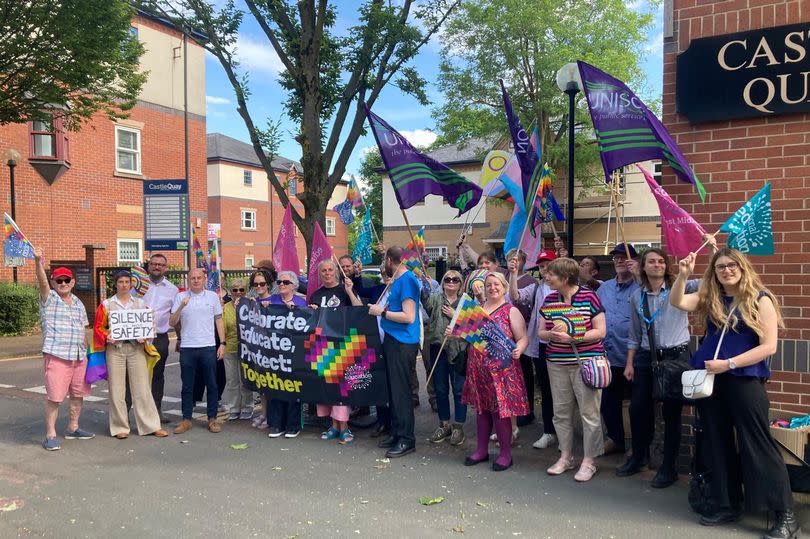Protestors say the pope isn't this hardline as they blast 'regressive' schools Pride guidance

Children at Nottinghamshire schools are suffering because of a bishop's "hardline" Pride ban, protestors say. The National Education Union (NEU) protested outside the Nottingham Catholic Diocese office in Castle Boulevard, Nottingham, following Bishop Patrick McKinney's recent guidance that teachers in the diocese's secondary schools should not celebrate June as Pride Month.
The religious leader's 40-page document published last month, titled 'Precious in My Sight', also cracked down on self-identification for transgender pupils. More than 30 protestors turned up at around 4pm on Friday, June 21 to challenge what the NEU had called "unnecessary and reactionary" guidance.
Dave Pike, senior regional officer for NEU East Midlands, said: "This guidance has banned Pride, massively restricted the role of LGBT student groups and reduced the support teachers can give to the most vulnerable. I went to a very religious school as a child and was bullied for being gay - my teachers did nothing about it.
Get the latest news straight to your phone by joining us on WhatsApp
"We are in a different place but actions like this take us back to that kind of place. These children are already marginalised and this opens them up to more bullying and discrimination."
The diocese's guidance said difficulties arise in Pride celebrating "a range of lifestyle choices and identities which are contrary to the teachings of the Church." It forbids children who want to change their gender from insisting on their preferred pronouns in almost every instance, denying them their preferred choice of uniform, changing rooms, showers and toilets.
There are 18 schools in the diocese across Nottingham and the wider county, including towns such as Mansfield, West Bridgford and Arnold. Councillor Cheryl Bernard, Nottingham City Council's cabinet member for children, young people and education who joined the protest, said she would be writing a letter to the diocese to demand a change.
"Nottingham is trying to be a child-friendly city that listens to what children want and makes sure that LGBT+ children are recognised, as well as being included as equals," she said. "This a regressive step that has been done without any consultation at all.
"The pope himself is less hardline than what the bishop has said in this guidance. This leaves children with nobody to talk to if they can't talk to their parents, as teachers are worried they might be sacked if they say anything. Children's mental health and wellbeing is at an all-time low after the Covid pandemic and this is not going to help LGBT+ children at all."
The diocese covers schools in almost all of Derbyshire, Lincolnshire, Leicestershire, and Rutland. Pride Month, which began in 1970, celebrates the LGBTQ+ community, including those who are gay, lesbian, bisexual and transgender. Whilst government guidance requires secondary schools to include content on LGBTQ+, there is no legal obligation for them to celebrate Pride.
A spokesperson for the Diocese of Nottingham said: "Catholic schools in the Diocese of Nottingham are communities of love and respect where all are welcomed and nurtured. This is the case every day of the year in our schools and is evidenced in a range of sources such as inspection reports from the Catholic Schools’ Inspectorate, Ofsted and staff surveys.
"Everything about the guidance, from its title ('Precious in My Sight') which is taken from the Book of Isaiah (43:4) to its details, makes it clear that it is designed to help our schools to provide the best possible support and pastoral accompaniment to any students questioning their gender in a manner which is consistent with the teaching of the Catholic Church."
The diocese added the guidance "states clearly that the purpose of the guidance is to respond to the needs of students who are questioning their gender and that it does not go into employment issues". Its representative argued the guidance had taken into account the Equality Act 2010 and the Public Sector Equality Duty, and would respond to the Department for Education’s final guidance on ‘Gender Questioning Children’ when it is published.

 Yahoo News
Yahoo News 
